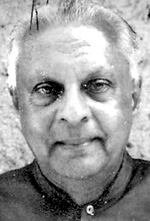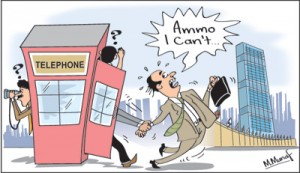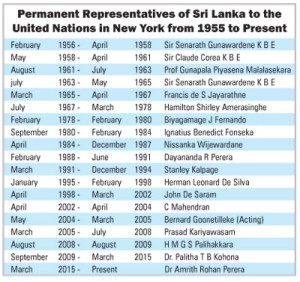Sunday Times 2
How we circumvented cold war politics to win UN membership

Man with a mission: Special Envoy Esmond Wickremesinghe, father of Premier Ranil Wickremesinghe
UNITED NATIONS – Back in the 1950s, the Cold War between the world’s two superpowers – the United States and the Union of Soviet Socialist Republics— was being played out in the corridors of power at the United Nations. Enter Sri Lanka (then Ceylon), emerging from independence from British colonial rule, and seeking membership in the supreme international body.
But the Soviets and the Americans – bitter political enemies – were vetoing each other’s resolutions not only on hot-button political issues but also on the right of independent nations to claim their legitimate seats in the world body.
Our first attempt at seeking membership was in May 1948 — three months after independence. The application was signed by D.S. Senanayake, the country’s first Prime Minister, who also held the portfolio of Minister for External Affairs.
But unfortunately we got embroiled in big power politics not of our choosing. The application was rejected by the Security Council where the USSR used its veto against us. The Council resolution said it “resolves to postpone” the decision of our admission until there was “sufficient proof that Ceylon is a sovereign and independent state.”
As the late Neville Kanakaratne, a former Sri Lankan Ambassador to the US, and a one-time senior UN official, would recount, our initial application for membership was vetoed on the ground we still had a defence agreement with the UK (and that Trincomalee was a naval base under the control of the British, despite our independence.)
The Soviets erroneously argued that Ceylon was not a truly independent nation state but still a veritable British colony hanging onto the apron strings of an English monarch. Therefore, it did not warrant a seat in the world body. The truth of the matter, however, was that we were victims of a Soviet ideological battle with the West.
 Sensing the deadlock, Prime Minister Sir John Kotelawela, seven years later, handpicked Esmond Wickremesinghe, a media mogul and a consummate political power broker, anointing him as a Special Envoy, with a single-minded mandate: to lobby US and Soviet diplomats for a politically-smooth passage for admission to the world body.
Sensing the deadlock, Prime Minister Sir John Kotelawela, seven years later, handpicked Esmond Wickremesinghe, a media mogul and a consummate political power broker, anointing him as a Special Envoy, with a single-minded mandate: to lobby US and Soviet diplomats for a politically-smooth passage for admission to the world body.
Esmond, father of Prime Minister Ranil Wickremesinghe, was not only a highly influential press magnate of outstanding stature, but also a political kingmaker and a skilled behind-the scenes negotiator. With strong support from R.S.S. Gunewardene, (who later became our first Permanent Representative to the UN), Esmond played a key role in successfully negotiating a “package deal”.
As part of this deal, we gained admission in 1955 in return for the US holding back its veto on Soviet allies such as Albania, Bulgaria, Hungary and Romania. Eventually, we were one of 16 countries, along with Jordan, Ireland, Portugal, Italy, Austria, Finland, Nepal, Libya, Cambodia, Laos and Spain, joining the UN on 15 December 1955.
Ernest Corea, a former editor of the Ceylon Daily News and who worked closely under Esmond at Lake House, said Sir John rewarded Esmond with an offer of a knighthood: a deserving title of Sir Esmond Wickremesinghe. But Esmond apparently turned it down — and the knighthood went to R.S.S. Gunewardene, later Sir Senerath Gunewardene.
 Even as Managing Director of the Associated Newspaper of Ceylon Ltd, Esmond always kept out of the limelight — even instructing all his editors never to publish his photo or feature him in any of the Lake House newspapers. Our admission to the UN only proved his skills as a successful negotiator — away from the public eye.
Even as Managing Director of the Associated Newspaper of Ceylon Ltd, Esmond always kept out of the limelight — even instructing all his editors never to publish his photo or feature him in any of the Lake House newspapers. Our admission to the UN only proved his skills as a successful negotiator — away from the public eye.
Sir John, unfortunately, did not get to make the planned “grand entry” at the UN because the UNP was swept aside by a political landslide in 1956 and S.W.R.D. Bandaranaike, the new SLFP prime minister, headed the country’s delegation to the 1956/57 sessions of the General Assembly, according to Ernest (currently living in splendid retirement in the US).
Bandaranaike made his first and last appearance at the UN where he had the distinction of speaking ex-tempore before an Assembly where most leaders read out a prepared text or more recently employed a teleprompter.
In his address to the UN General Assembly on 22 November 1956, he said: “My country, together with many others, languished in the anterooms of this Organisation for many years until, by a signal stroke of statesmanship last year, sixteen countries were admitted to membership of the United Nations.”
He regretted there were countries awaiting membership “whose claims to such admission appear to many of us to be unquestioned and whose membership will undoubtedly make more fully representative of the membership of this great world Organisation for peace.” The two countries he singled out were Japan (which gained admission one month later in December 1956) and the People’s Republic of China (which replaced Taiwan or the Republic of China in 1971). Currently, there are 193 member states in the world body.
Still, our admission to the UN on December 15, 1955, took the government by surprise, with no immediate office space to house the Sri Lanka Mission. A good Samaritan came in the guise of Lawrence Gunatilaka, a trail blazing Sri Lankan who had arrived in the US in the early 1950s.
Lawrence, who was a prominent member of the tiny expatriate community at that time, offered his apartment at West 73rd Street in the service of his country. And his apartment became the first home of the Sri Lanka Mission (the UN uses the term Mission instead of Embassy or High Commission).
The mailing address of the apartment even adorned the first set of letterheads printed by the Mission. Lawrence’s apartment was the headquarters for about two to three months until the Mission found a brownstone in Sutton Place.
In the mid 1950s, as rumour had it, the entire Sri Lankan community in New York could have been comfortably squeezed into a single phone booth on a street corner. As anecdotes go, there was a story of how Sri Lankan diplomats would stand outside the UN building on 42nd Street and First Avenue scouting for scarcely seen Sri Lankans on the New York horizon. And the first Sri Lankan passerby was forcibly enlisted as a member of the delegation kicking and screaming.
Four years after our admission, we were elected as one of the non-permanent members of the Security Council — the most powerful political body in the Organization with the power to declare war and make peace — in October 1959 and served a two-year term, beginning January 1960.
The second singular honour came in September 1976 when Ambassador Shirley Amerasinghe was elected President of the General Assembly, the highest policy making body at the UN. Later he also chaired the historic Law of the Sea Conference which produced the ultimate treaty governing the ocean sea bed.
And then came the election of Justice C.G. Weeramantry to the International Court of Justice in the Hague where he served during the years 1991-2000. An equally superlative achievement was Jayantha Dhanapala’s presidency of the 1995 Nuclear Non-Proliferation Treaty Review and Extension Conference, a landmark event in UN disarmament history.
Meanwhile, in December 1968, the General Assembly created a UN Special Committee to Investigate Israeli Practices Affecting the Human Rights of the Palestinian People in the Occupied Territories. The first chairman of that Committee was Ambassador Amerasinghe. The Committee, which is 48 years old, has been chaired by successive Sri Lankan ambassadors.
Since then, Sri Lanka has chaired or co-chaired dozens of UN committees over the last 60 years, including the Adhoc Committee to Eliminate Terrorism (chaired by Ambassador Rohan Perera); the UN Secretary-General’s Advisory Board on Disarmament (chaired by Ambassador H.M.G.S. Palihakkara); the General Assembly’s Legal Committee and the UN Committee on Marine Biological Diversity Beyond National Jurisdiction (chaired by Ambassador Palitha Kohona); and the UN Committee on the Protection of the Rights of Migrant Workers and the UN Review Conference on Illicit Trade in Small Arms and Light Weapons (chaired by Ambassador Prasad Kariyawasam), among several others.
But at the UN, some chairmanships are for life (the life of the country, not the life span of the ambassador). And many of our ambassadors inherited their chairmanships — handed over by an outgoing ambassador to the incoming ambassador.
As a result, successive Permanent Representatives – including B.J. Fernando, Ben Fonseka, Nissanka Wijewardane, Daya Perera, Staley Kalpage, H.L. de Silva, John de Saram, C. Mahendran, Bernard Goonetilleke (acting on a brief tenure), Prasad Kariyawasam, H.M.G.S. Palihakkara, Palitha Kohona and Rohan Perera — continued to chair several committees and conferences, including the UN Adhoc Committee on the Indian Ocean Zone of Peace.
As we kept chairing as many UN committees, an Asian diplomat was jokingly quoted as saying: If Sri Lanka continues this trend, the UN will one day run out of chairs.
Any furniture salesmen in town?
(Thalif Deen is UN Bureau Chief and Regional Director Inter Press Service (IPS) news agency at the United Nations.)

